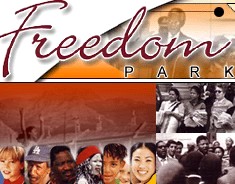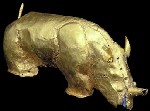Freedom Park to tell SA's story
23 September 2004
Human evolution dating back 3.6 billion years, and the struggle of humanity for freedom in South Africa, are among the stories that will be told at Freedom Park, a one-stop heritage precinct that will tell South Africa's tale in a visual and interactive way, portraying a vision for the future embedded in the African Renaissance.
Under construction on a 52-hectare site at Salvokop on the outskirts of Pretoria - with the first phase now complete - Freedom Park will be a dedicated precinct celebrating South Africa's heritage, a centre of knowledge aimed at creating a deeper understanding of the country and its people.
Comprising a memorial, interactive museum and garden of remembrance, the park will strive to accommodate all of the country's unfolding experiences and symbols to tell one coherent story of the struggle of humanity for freedom in South Africa - the struggle for survival, land and resources and how they shaped the social,
economic, political, cultural and historical landscape of the country.
The park will address gaps, distortions and biases to provide new perspectives on South Africa's heritage, challenging traditional narratives through a re-interpretation of the country's existing heritage sites.
Freedom Park will also highlight South Africa's role in the genesis of early life forms and later hominids, some of which evolved into modern homo sapiens, tracing evidence of humanity's evolution found in South Africa - including life forms and geological formations dating back 3.6 billion years found in Barberton, regarded as one of the most ancient places on earth.
The government has put aside about R350-million towards building the Park over the next three years, according to park chief executive officer Lindiwe Gadd.
First phase complete
Construction of the first phase of Freedom Park, a 25 000 square metre garden of remembrance, began in July 2003 and was
completed by March 2004, in time for Freedom Day - and the tenth anniversary of democracy in South Africa - on 27 April.
The garden of remembrance, a landscaped garden forming the external environment of Freedom Park - and soon to be interspersed with monuments, statues and sculptures - symbolises the final resting place of the fallen heroes and heroines of the conflicts which shaped the history of South Africa.
In 2003, a series of cleansing, healing and symbolic reparation ceremonies took place in each province across the country, acknowledging the seven main conflicts in South Africa's past - genocide, slavery, the wars of resistance, the Anglo-Boer wars, the first and second world wars, and the struggle for liberation from apartheid.
Some soil from the site of each ceremony, along with a plant unique to each province, was collected and sent to form part of the garden of remembrance, in honour of those affected by each of the seven conflicts. A roll of people
who died during the seven conflicts will also form part of the garden.
At the official handover of the garden on 8 March 2004, President Thabo Mbeki said that it would be a place for all to meditate on what had been achieved in South Africa.
Freedom Park, Mbeki said, would not be a place of grief and mourning but of celebration, a tribute to African and human dignity, and a place for the renewal of the human spirit.
Still to come
The completed Freedom Park will feature a memorial, an interactive museum, an open space capable of accommodating at least 5 000 people, a conference centre and commercial precinct, and a library and audio-visual library. Construction is expected to be completed by 2007.
The Freedom Park memorial will seek to facilitate a communal process of commemorating the pain and celebrating the victories of the past, by preserving the memory of victims of conflicts and human rights abuses caused by slavery, colonialism and
racism, and by honouring the victims, heroes and heroines of the struggle against apartheid.
The museum, through interactive, state-of-the-art exhibitions, will serve to present and preserve South Africa's pre-colonial, colonial, apartheid and post-apartheid history and heritage.
The museum will not function as an "elite" space for the collection and study of cultural and natural artefacts only, but will also assimilate a "people element", making it an accessible public place.
When the last brick is laid, Freedom Park will be an inclusive memorial site enabling South Africans from all corners of society to commemorate the pain of the past, and celebrate their victory.
According to executive chairman of the Freedom Park Trust, Dr Mongane Wally Serote, Freedom Park will become "a permanent reminder for us, now and for future generations, that South Africans did take a step forward to put closure to the past while not forgetting it.
"By doing so we
give ourselves a chance to address issues of the present and future, and commit ourselves as a generation to handing over an intact, non-racial, non-sexist, democratic, prosperous and powerful nation to our children."
SAinfo reporter






